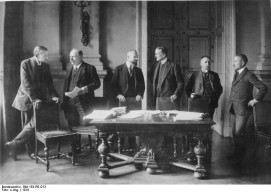Post WWI – The rise and fall of international law
Posted on Monday, August 4 2014

By Dr Melanie Klinkner, Senior Lecturer in Law.
World War I, though centred in Europe, was a global war initially involving the Allies on the one side, and the Central Powers on the other, but other countries were drawn into the conflict, turning it into the largest war in history. A staggering 9 million combatants were killed and this large cost of life galvanised many legal and political minds to try and avoid such future bloodshed by working towards peace and stability.
The Treaty of Versailles is perhaps best known for the demands placed on Germany to disarm, make substantial territorial concessions, and pay reparations to certain countries, but the Treaty has also great significance for international law. The League of Nations was established, as outlined in the Versailles Treaty of 1919, to steer away from the traditional power-distribution through injecting some more democratic and open elements. Its main goal was to maintain world peace and the idea goes back to 1795 and Immanuel Kant’s ‘Perpetual Peace: A philosophical sketch’. Kant’s notion of a peaceful world community did not lie in the creation of a global government, also rejected by the League of Nations, but in the hope that States would be free, respecting their citizens and welcoming foreign visitors as fellow rational beings.
One requirement in the Covenant of the League was that States, before resorting to war, had to exhaust judicial or political dispute settlement processes. In a further attempt to promote peace, the 1928 Pact of Paris, State parties forswore the resort to peace as means of national politics – though this initiative was hardly successful as ultimately evidenced by the Second World War. It is ironic that the 1919 Peace Treaty designed to end all wars led to a war which is unique so far in terms of non-combatant deaths – World War Two.
Noteworthy for international criminal law, the Treaty of Versailles also wanted the question examined whether war crimes trials for the defeated German Elite, including the Kaiser, were an option. The Commission on the Responsibilities of the Authors of War were divided on the issue. The majority recommended inter alia the establishment of a tribunal to prosecute suspected war criminals including the prosecution of defeated heads of state. Though an international Tribunal was not established, some German individuals accused of war crimes were tried in 1921 by the German authorities in the Leipzig War Crimes Trials.
But the inter-war period was fruitful in other ways through international legal innovations such as the creation of a World Court in 1922, optimistically called the Permanent Court of Justice. Whilst the Court did not have compulsory jurisdiction over all disputes, through deciding cases, a substantial body of international jurisprudence emerged. One such example considered to be an important foundation of international law is the Lotus Principle suggesting that States may act in any way they wish so long as they do not contravene an explicit prohibition.
Ambitious efforts were also made to codify international law. The prime example is the 1933 Montevideo Convention setting out the definition, rights and duties of statehood. Article 1 is best-known as it spells out the four criteria for statehood which remain relevant to this day.
The state as a person of international law should possess the following qualifications: (a) a permanent population; (b) a defined territory; (c) government; and (d) capacity to enter into relations with the other states.
Clearly some of the creations from this inter-war period had a short life, though many of the ideas and concepts have survived or been re-incarnated in the aftermath of the WWII. In fact, international lawyers became ‘heroic crusaders’ post 1945, building a new world; The United Nations replaced the League of Nations, the International Court of Justice the Permanent Court of Justice, and German and Japanese leaders faced trials for crimes under international law in Nuremberg and Tokyo.
No doubt, international law failed in avoiding carnage and maintaining world peace demonstrating its key weakness – the implementation of its norms is linked to political will.
 Bournemouth University
Bournemouth University